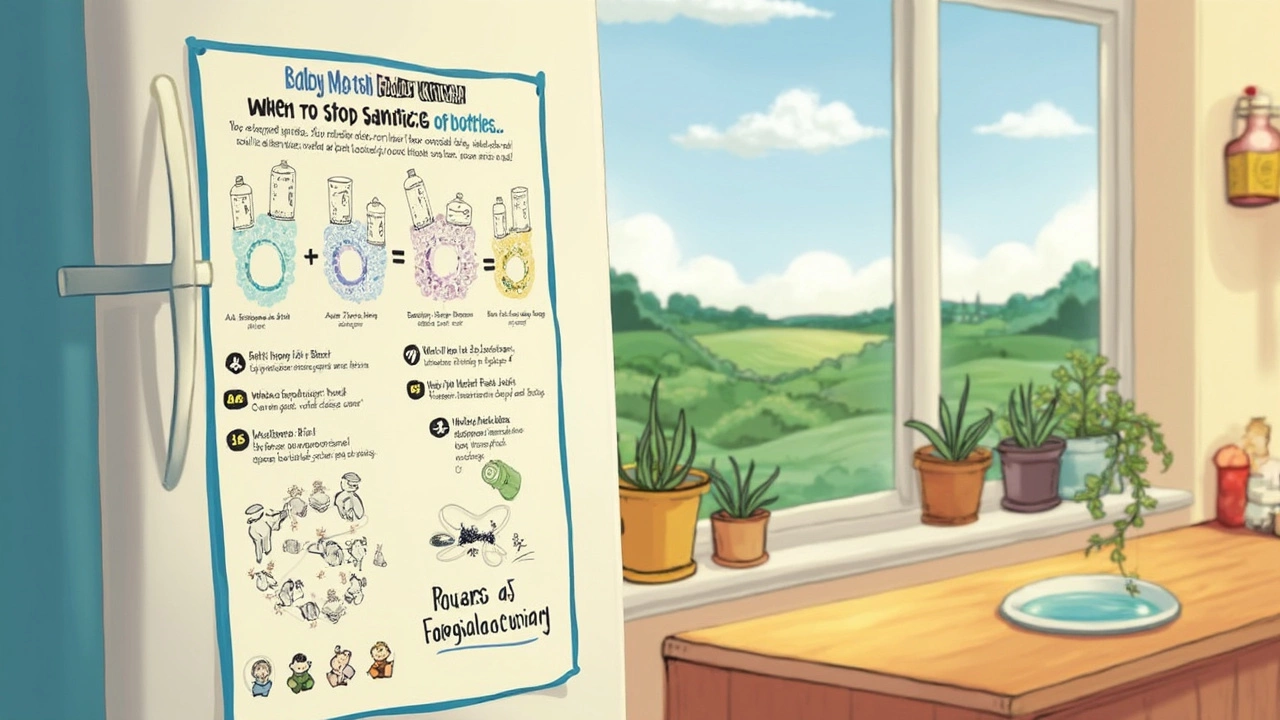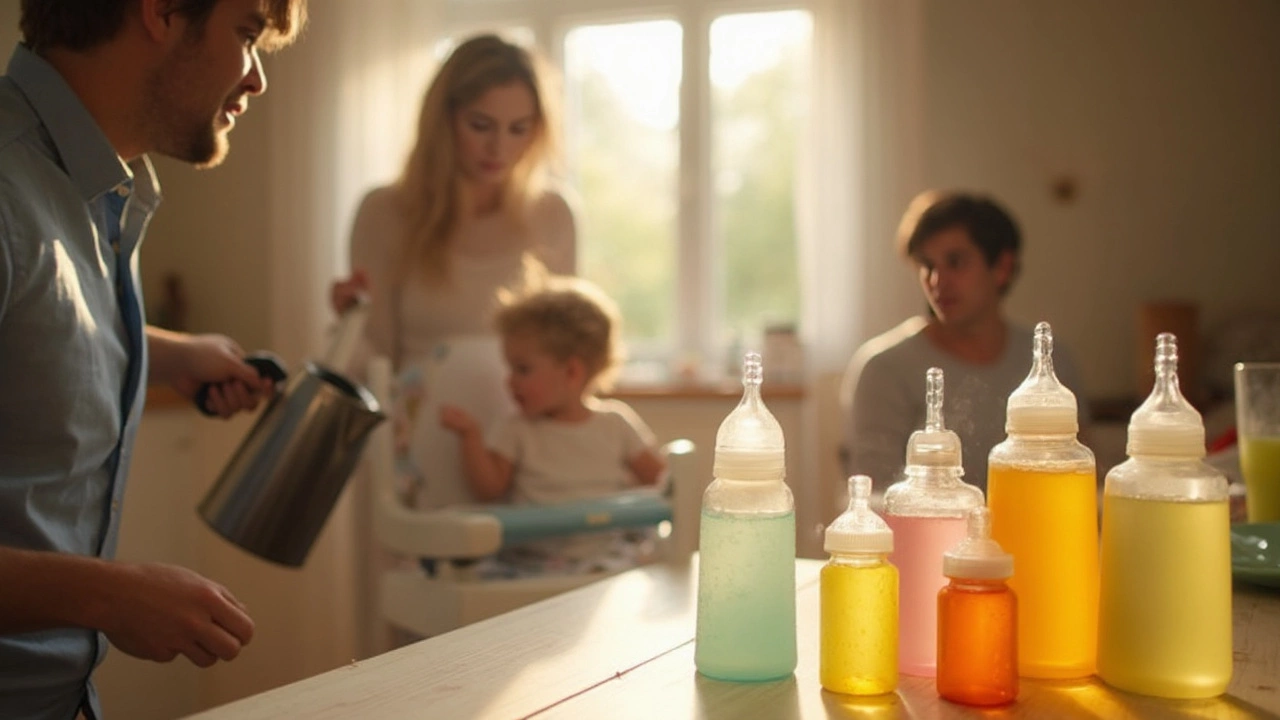Alright, let's face it—being a parent comes with a whirlwind of questions. One you might be pondering right now: when can you finally stop sanitizing those baby bottles? It’s all about balance between safety and keeping your sanity intact.
The general guideline from many health organizations suggests that you can relax the sanitizing routine around your baby's first birthday. But, and this is important, make sure you’re considering local water quality and your child's overall health. If your tap water isn't the cleanest, you might need to keep up the sanitizing a bit longer.
But hey, don’t just take a generic guideline and run with it. Remember, every family is different, and what works for one might not suit another. Stay tuned, and we’ll dive into everything you should consider before making this decision, even throwing in some handy tips for when you do ease off the sterilizing.
- Understanding When to Stop Sanitizing
- Factors to Consider
- Alternative Bottle Cleaning Tips
- Ensuring Continued Hygiene
Understanding When to Stop Sanitizing
So, you've been at this baby bottle sanitizing game for a while now. But at what point can you ease up? The rule of thumb is around the time your little one turns one. That's because by then, their immune system is more developed and they're crawling around, exploring every nook and cranny. It's a new chapter where sanitizing baby bottles every single time might not be as crucial.
Interestingly, guidelines differ slightly across the globe. The American Academy of Pediatrics suggests that regular cleaning, as opposed to sanitizing, is sufficient once babies reach the age of 12 months. However, if you're dealing with a premature baby or a child with health issues, it may be wise to continue sanitizing for a bit longer.
"By the age of one, many parents can relax their bottle sterilization routine, provided good bottle cleaning practices are in place," advises Dr. Katherine O'Connor, a pediatrician at the Child Health Institute.
Why is the one-year mark so significant? Well, most babies start on solid foods by then. They’re tackling a range of foods, getting exposed to different bacteria, which helps build their immune system naturally. Plus, if your water’s safe to drink, routine washing is often good enough.
To recap, here's a quick checklist:
- Your baby's age: Over 12 months? You can probably stop.
- Your water quality: Is it clean and safe? Great, you're good to go.
- Baby’s health: Any ongoing health issues? Consider consulting your doctor.
Remember, while bottle cleaning is still important, it’s okay to lighten up a bit once you hit that one-year milestone.
Factors to Consider
Deciding when to stop sanitizing those baby bottles involves looking at a bunch of different factors. You don’t want to leap too soon, but you definitely don’t want to be washing away your free time long after it’s necessary either. Let's break it down.
The first thing is your local water quality. If you’re living somewhere where the tap water is questionable, you might have to sanitize longer than someone with access to safe drinking water. Remember, not all water is treated the same. In some places, even adults boil their water before drinking it.
Another factor is your baby’s immune system. If your little one was born prematurely or has any health issues, keeping things extra clean can still be essential. But don't just take my word for it. Dr. Emily Jenkins, a pediatrician, mentioned,
"For healthy babies over a year old with no extra health concerns, it’s generally safe to stop sanitizing as long as you maintain regular cleaning practices."
Let’s also not forget about food safety rules. If you’re still mixing formula, you might need to keep sanitizing a bit longer because that stuff can grow bacteria pretty fast if not handled right. Switching to cow's milk or other alternatives often changes the cleaning game.
So, here’s what it boils down to: check your local water situation, think about your child’s health, and remember that regular cleaning still goes a long way even when you step away from frequent sanitizing.

Alternative Bottle Cleaning Tips
If you’re thinking of easing up on the bottle sanitizing, there are some handy tips to keep those bottles clean without going through the sanitizing rigmarole every time.
First off, good old-fashioned soap and water is your friend. Once your little one is past the newborn stage, washing with hot, soapy water can do the trick if your child’s immune system is up to snuff. Make sure you rinse thoroughly to remove any soap residue.
- Sanitizing baby bottles in the dishwasher is a win-win! It gets the job done with minimal effort. Ensure your bottles are dishwasher-safe, though.
- If you’re on the go, reusable bottle-cleaning wipes or a portable bottle brush are fantastic for quick cleans. They don’t replace a proper wash but are lifesavers for a quick clean.
- For a deep clean now and then, toss the bottles into a pot of boiling water for a few minutes. It’s an easy method that never goes out of style.
Dr. Julia Smith, a pediatric expert, said,
"Properly cleaned bottles help prevent unnecessary illness but continuous sterilizing isn’t always necessary after six months, especially if you're keeping a watchful eye on regular cleaning routines."
Here's a little hack: keep spares! Having a few extra bottles on hand means you’re not scrambling to clean on a busy day.
With these tips in your parenting toolkit, you'll navigate this stage with less stress. Just remember to factor in your unique circumstances, like local water quality and your bub’s health. You've got this!
Ensuring Continued Hygiene
Even after you've stopped religiously sanitizing baby bottles, keeping things clean is still key. Just because you’re easing up on the full-blown sterilizing, that doesn't mean you're off the hook when it comes to hygiene.
One important thing is to clean those baby bottles thoroughly. Use hot, soapy water and a good bottle brush to reach all those tricky spots. Rinse everything well to get rid of any soap residue, which is not something you want your kiddo ingesting!
- Disassemble bottles completely before washing.
- Make sure to clean bottle nipples thoroughly — those are hotspots for germs.
- Air-dry bottles on a clean rack instead of towel drying, reducing the chance of germs transferring from towels.
It's not just about the bottles. Pay attention to how you're storing them. Keep them in a clean, dry space. If your baby's immune system is delicate, be extra careful with this.
Curious about the germ risk you’re dealing with? Check out this simple comparison:
| Item | Germs per square inch |
|---|---|
| Kitchen Sink | 1,000,000 |
| Baby Bottle | 100,000 |
Notice how close those numbers are? Kitchen sinks are a germ magnet, and without regular cleaning, your baby bottles can be, too.
Got an adventurous eater? As they start on solids, their bottles might take a backseat, but stay vigilant about cleaning anything your baby puts in their mouth. The more you stick to a solid routine, the better off you'll be. And remember, keeping things clean is not about making life harder — it's about making things safe for your little munchkin.
